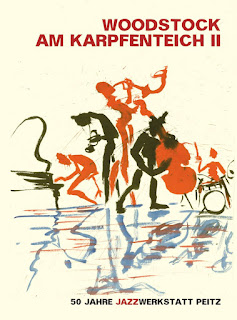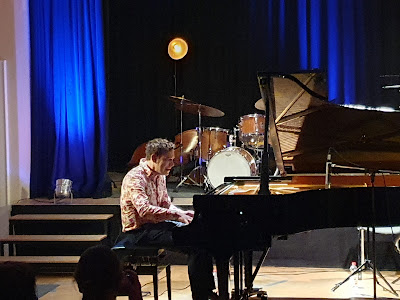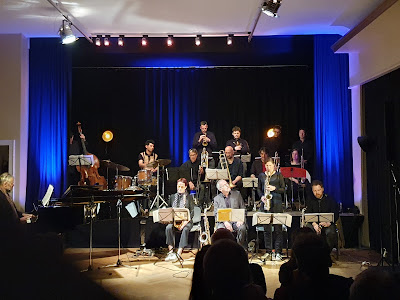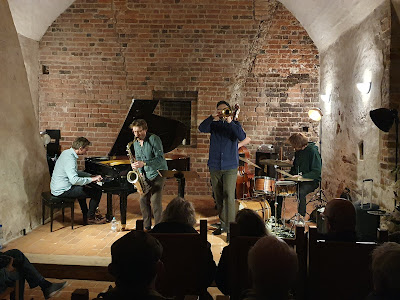By Paul Acquaro
The story of the Peitz jazz festival, a festival that was founded in 1973 in the German Democratic Republic (GDR) town of Peitz, is for good reason, easy to mythologize. Festival founders, Ulli Blobel and Peter “Jimi” Metag, both from the region, got their career start with the festival, and while they took different paths after the festival was shut down by the authorities in the early 1980s, the festival found its way back to the town in 2011.
When one pulls into the small village located on the shores of the Karpfenteich (which happen to be the largest artificial ponds in Europe), it is hard to believe that one upon a time, when this area, located on the northern end of the brown coal mining area that stretches to the city of Cottbus and beyond, was both another country and host to a festival that drew thousands of young people to listen to free jazz.
Affectionately called Woodstock am Karpfenteich, the nickname of the Peitz festival captures the spirit of the time. In the GDR, it was a moment for the younger generation to get together and express themselves in a closely watched political system. Going back to the programs from the festival’s start from 1973 until 1982, when it was shut down by the authorities, is pretty mouthwatering. Names like Peter Brötzmann, Johannes Bauer, Conny Bauer, Leo Smith, Peter Kowald, Günter “Baby” Sommer, Harry Beckett, Harry Miller, Louis Moholo, John Surman, Barre Phillips, Barry Guy, and so many more, ring a Pavolvian bell for the the free jazz fan. Fortunately, much of the music was recorded and has been – and still is being – released by Blobel on his Jazzwerkstatt label. Starting in 2011, the festival started up again in Peitz, with a just as rich line ups – if not more so – of musicians. For a quick overview of the Peitz festival in its fist incarnation, check out Martin Schray’s review of the Jazzwerkstatt Boxset from 2014.
I had first caught wind of the Peitz festival while at another Jazzwerkstatt event in 2014 on a visit. It was a historic line up at the Haus der Brandenburgisch-Preußischen Geschichte in Potsdam, a city half hour by the city train (S-Bahn) from the main station in Berlin. The event was a multi-day concert celebrating the release of the first Woodstock am Karpfenteich book and featuring concerts by Alexander von Schlippenbach, Manfred Schoof, the Globe Unity Orchestra, Aki Takase and Rudi Mahall and more. I was in ‘deep learning’ mode and cleaned up the merchandise table pretty well. After learning about the Peitz festival, I made plans to visit again in June of 2015 to attend. It turned out to be the first of all the rest of the festivals for me, having missed only 2016 due to a scheduling conflict.
So, yes, I bought into the mythology. I have a copy of Woodstock am Karpfenteich, the aforementioned boxset, a DVD about the festival, and many of the CD releases that were made from the festival, the latest being German jazz woodwind legend Ernst Ludwig Petrowsky with the equally revered pianist Alexander von Schlippenbach and renowned drummer Christian Lillinger entitled Luten at Jazzwerkstatt Peitz, taken from their 2011 appearance at the then newly reinstated festival. A few weekends ago, my wife and I attended Jazzwerkstatt’s “50 Jahre Woodstock am Karpfenteich” event, which was a long weekend of concerts beginning at Institut Français Berlin in the Charlottenberg area with the launch of the newest Woodstock am Karpfenteich II book – an enjoyable, and surprisingly quickly assembled account of the festival since its 2011 reboot. The quickness of the books creation is no criticism, just a fact, as one of the contributors, Uwe Wernke, recalled at the event, that he received a call around Christmas 2022 from Blobel who said let’s put out a follow-up to the first Karpfenteich book. Four months later, the book, crisp and shiny from the publisher was for sale.
So far, I have read only the first chapter, which is Blobel’s engaging recounting of his experiences since leaving the GDR and landing in Wuppertal in the West in the mid 1980s. There are also chapters from long-term concert attendees and supporters (Uwe Warnke, Thomas Krüger), critics and journalists (Bert Noglik, Christoph Dieckmann) and musicians (Friedrich Schoenfeld, Peter Ehwald, Walter Küssner, Gunter “Baby” Sommer, Wolfgang Schmidtke). The second half of the volume is an archive of all the concerts held since 2006, when Blobel began the Jazzwerkstatt record label and making his way back into promoting and supporting jazz.
The weekend’s series of events was interesting for its both its locations as well as its breadth of music. Leading up to the weekend, it celebrated the locations of the Jazzwerkstatt events, first at the Institut Français, then at the Berliner Philharmonic’s small hall (which is just as spectacular as its bigger brother, next door), and over the weekend, the concerts were held in the town of Peitz. At the opening, a pianist new to Jazzwerkstatt world, Marc Schmolling, performed an energetic and focused solo set. He began with a dramatic wave of his hand and for the next forty minutes kept the energy flowing. After a very brief book talk (I had expected a full-on reading) which was mostly giving thanks to everyone who helped with the book, Wolfgang Schmidtke, long acquainted with Jazzwerkstatt, took the stage with his big band. The group, full of notables from the Berlin jazz scene and beyond, worked though a carefully arranged set of music from the Kurt Weill song book (“you know, Kurt Weill, the German Real Book” joked a musician in the audience to me). The arrangements kept true to the original feels of the songs, though with some updates to keep the modern ear attuned. My attention picked up when the group dug into ‘Pirate Jenny’ from the Three Penny Opera, and somehow I nearly missed ‘Mack the Knife’ as the famous melody was deconstructed into wispy quotes.
 |
| Inside Colours: Julie Sassoon, Lothar Ohlmeier, Mia Ohlmeier. Photo (c) Cristina Marx/Photomusix. |
The next night at the Berlin Philharmonic’s Kammermusiksaal, pianist Julie Sassoon, along with her partner Lothar Ohlmeier on saxophone and bass clarinet along with their daughter Mia on drums, delivered a wonderful set that had the reflective qualities of an ECM recording but with an extra jolt of energy. Sassoon’s melodies are somewhat spare but effective and the trio was able to generate an infectious concentrated energy around them. Their set was followed by guitarist Marc Ribot with his Jazz Bins groups, namely Joe Dyson on drums and Greg Lewis on Hammond B3 organ, who together explored the nexus of groove, soul and rock. They began with a quickly escalating rendition of James Brown’s “Ain’t it Funky Now,” and while it’s the guitarist’s band by name, the performance was owned by Lewis’ knowing touch at the B3 and Dyson’s otherworldly drumming. Ribot saved some his most ripping moments for the closing songs, especially the penultimate one, which brought out the guitar hero that – at least – I was waiting for.
Saturday, the celebration moved eastward to the church and the restored ruins of the 17th century Malzhausbastei in Peitz. We did not make it until the following day however, missing concerts like ones from pianist Cecila Voccia, trumpeter Ryan Carniaux, and the singer Uschi Brüning.
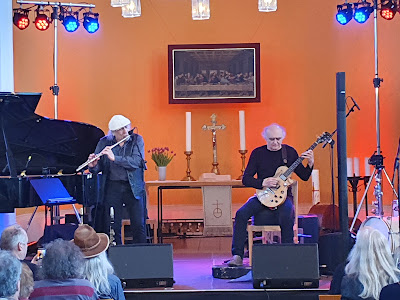 |
| Jiří Stivín and Joe Sachse |
The first concert we attended on Sunday afternoon in Peitz was in the Stueler Kirche, a nicely renovated space with a great pipe organ. The show was the duo of guitarist Joe Sachse and woodwindist Jiří Stivín. Sachse’s playing was delightfully supportive of Stivin’s jazz inflected playing, which could be both cutting and whimsical on the flute and saxophone. The end of the concert included the Kirchenmusikdirektor Wilfred Wilke, for one of the most abstract and freely improvised pieces of the show.
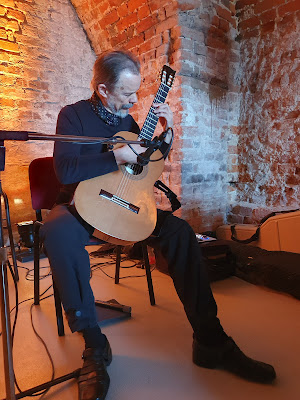 |
| Uwe Kropinski |
The next concert followed a quick change of venue over to the much smaller and intimate Malzhausbastei, where a second book talk was to be followed by guitar wonder Uwe Kropinski. There was, however, an unexpected twist: Kropinski’s unique custom made acoustic guitar had just fallen onto the concrete floor and the head stock had broken off. So, after a quick reintroduction of the Woodstock am Karpfenteich II book, the audience’s attention shifted to Kropinski who proceeded with a replacement guitar provided by a local concert goer. With less frets and features than he is accustomed to, he quickly reconfigured his approach and played a beautiful set of classically tinged compositions, along with one he introduced as a ‘proper’ jazz tune. Kropinski ended with a flourish of unusual tones created with use of his custom “super pick” and anyone unaware of his last minute guitar switch would be none the wiser.
There was a break before the next show, which was set to also happen at the Malzhausbastei, which though cozy, was really too small of a venue for the crowd that had shown up. Not wanting to miss out on the fiery free jazz trio of MOTUSNEU – saxophonist Bruno Angeloni, drummer Steffan Roth, and bassist Stephan Deller – we made sure to be back at the venue early. We became alarmed though when 10 minutes before the show people were showing up but not the musicians. A recon mission revealed that the concert had been moved to the impressive, cavernous Festungsturm, the 16th century medieval fortress in the middle of the town. We ran and snapped up the last two seats, a bit frazzled. Quickly however, the blazing melodic shards from Angeloni and telepathic reciprocation from Roth and Deller re-oriented us. The trio’s persistent sound rose and fell as Roth seamlessly switched between roiling pulse and energetic thrust.
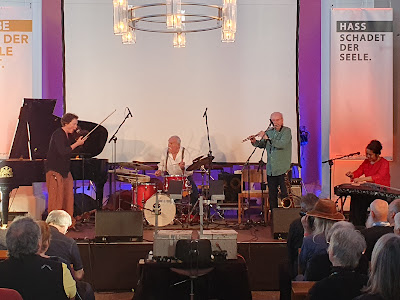 |
| Gundra Gottschalk, Gunter “Baby” Sommer, Friedhelm Schoenfeld, Xu Fengxia |
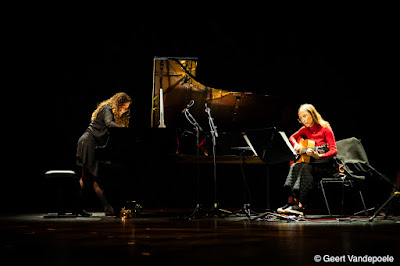 |
| Sylvia Courvoisier, Drew Gress, Kenny Wollensen |
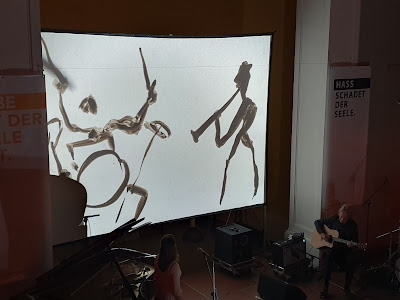 |
| Helge Leiberg’s evolving imagery |
A short pause gave everyone some time to enjoy the sunny and mild evening weather, before the concerts moved back to the church. The set kicked off with a multi-generational quartet featuring percussionist Gunter “Baby” Sommer, woodwindist Friedhelm Schoenfeld, violinist Gundra Gottschalk and guzheng player Xu Fengxia. The musical encounter was full of playful free jazz pathos and an energetic appeal, a duet between Gundra and Fengxia that covered an impressive range tones and styles, complete with vocalizations and unexpected twists. A duet between Sommer and Schoenfeld was equally engaging, though following a more expected path. Next, New York’s Sylvia Courvoisier Trio, featuring the pianst along with bassist Drew Gress and drummer Kenny Wollensen, entranced the audience for an hour. Big open chords, galloping rhythms and tightly interlocking melodic tunes were supported by expressive improvisations from all three musicians. Following a short reconfiguration of the stage, a free improvising group with Almut Kühne on vocals, Ulrich Gumpert on piano, Lothar Fiedler on guitar, Heiner Reinhard on bass clarinet and tenor saxophone, and Willi Kellers on drums, complimented Helge Leiberg’s live paintings, which he applied to glass and manually manipulated on two overhead projectors. The effect was delightful, playful, and sometimes quite jarring as the “primitive” musical imagery mixed with the smeary and sometimes surprisingly precise sounds of the band.
It was getting late and just as we thought our musical intake levels were about maxed out, the scene shifted back to the fortress with saxophonist Peter Ehwald leading an impressive group featuring the trumpeter Tomasz Dąbrowski, pianist Stefan Schultze , bassist Robert Landfermann and drummer Mortiz Baumgärtner. Proceeding with a gentle toughness, Ehwald led the band through an exciting, cinematic set of music, closing the 50th anniversary weekend on a high note.
This coming September, Jazzwerkstatt Peitz number 60 will be an “end is the beginning” sort of deal. Ulli Blobel is hanging up his organizer hat and passing the torch to the next generation. His daughter Marie, who has already begun organizing concerts in Berlin, is taking the reigns. Meanwhile, we’ll be eager to see what the future brings.


